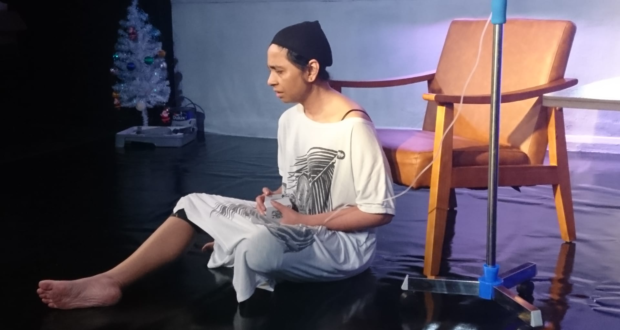A bold take on a work by one of surrealism’s masters, bringing the avant-garde to KenningtonSummary
Rating
Ok
The White Bear is a lovely pub, just a short walk from Kennington tube station and filled with bizarre bear-themed art that is amusing to peruse. The food is delicious although the 10% discount for theatregoers didn’t seem to exist, despite it being shouted about on their website. Upstairs you’ll find the theatre, and it’s your typical pub-based performance space, with a few rows of chairs and a blank canvas. Nothing unusual at all.
It is here that Director David Fairs is staging surrealist Jean Cocteau’s monodrama The Human Voice, in a version adapted by Daniel Raggett. In this production, we watch an unnamed, solitary performer talking on the phone, never hearing the person on the other end. Whilst this concept has real potential, the play struggles to capture the attention of the room. It’s hard to tell if the gaps between the unheard speech on the other end of the phone are too long, or if there’s just not enough drama to keep the audience engaged throughout.
It’s quite an eerie set up in many ways, with a shiny vinyl floor, medical curtains against one wall, and the stand for a drip. On entering the space Priti Colbeck hangs up the bag for the drip and takes a seat with her back to us. This is when she starts taking phone calls and it’s unclear why she seems surprised when it’s not who she wants it to be: presumably she’d have their number saved on what is clearly a smartphone. This isn’t where the confusion stops, and at many times it’s unclear if this is intentional or not. There’s an assumption that she is a cancer patient, as we see her trying on wigs, possibly lying about her diagnosis to her ex-partner, but then later on she’s talking about having tried to kill herself with sleeping pills. Perhaps it’s both, but it feels muddled.
I often don’t research too much into a play before I go, loving the element of surprise. But in this instance, it may have helped. Knowing it’s an adaptation of a work by Cocteau, who was known for his surreal imagery, could have enabled the bizarre moments to sweep over me. At times, I felt as though I’d walked into a room at Tate Modern, half expecting to read a little card on the wall stating it’s the latest piece by performance artist Marina Abramović.
Having said all this, even if it was a surreal piece pushing the boundaries of theatre, it still needs to be engaging. Colbeck clearly tries to keep us entertained, with her increasingly exasperated fake phone calls, but it’s not long into the play that you sense the audience start to tire. It’s really hard to stay engrossed for the full show. With a bit more polish, and perhaps pushing the surrealism further so that it feels intentional, this could be a really interesting piece of theatre. Sadly, for me, it was just not quite there yet.
Written by: Jean Cocteau
Adaptation by: Daniel Raggett
Directed by: David Fairs
Assistant direction by: Conor O’Kane
Produced by: Kean Street Productions (with the kind permission of the Chairman of the Comité Jean Cocteau)
The Human Voice plays at White Bear Theatre until 9 March. Further information and bookings can be found here.
 Everything Theatre Reviews, interviews and news for theatre lovers, London and beyond
Everything Theatre Reviews, interviews and news for theatre lovers, London and beyond



